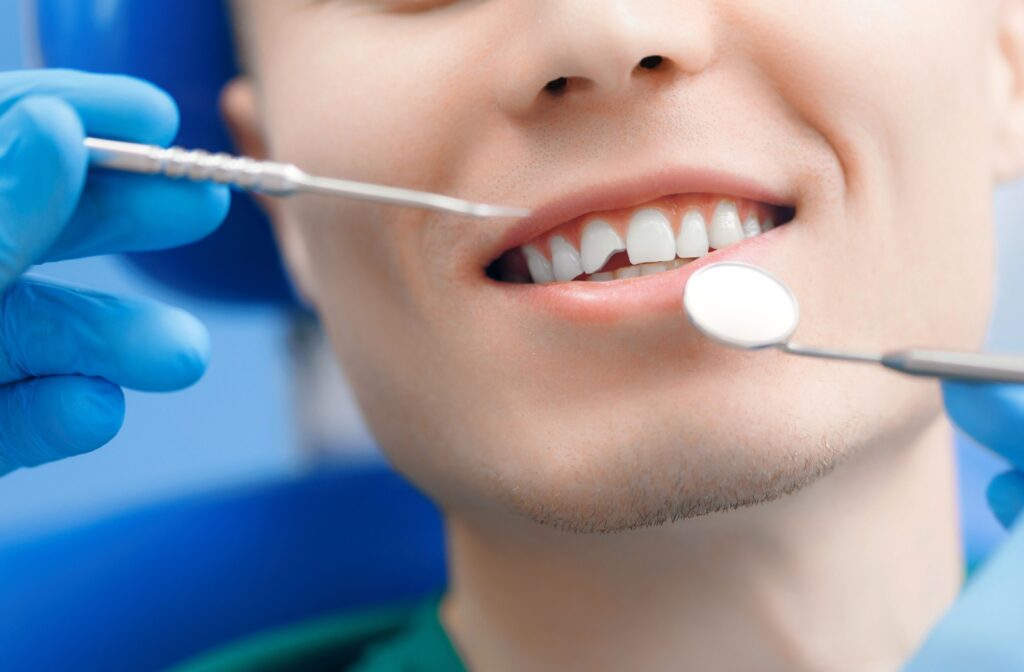Life’s ongoing adventures can sometimes result in sudden injuries that cause chipped teeth. Sudden pressure or biting something hard can also cause teeth to chip, leaving them visibly cracked, uneven, and damaged. This can lead to cosmetic and oral health concerns.
Depending on the extent of the damage, a chipped tooth can be repaired using several techniques like:
- Dental bonding
- Dental veneers
- Dental crowns
- Dental implants
Attempting to fix chipped teeth at home can lead to more serious dental problems. Chipped teeth are considered a dental emergency and should be treated professionally.
I Chipped a Tooth: What to Do
A chipped tooth occurs when a small or large piece of your tooth breaks off, leaving it uneven, sharp, or visibly cracked. Teeth may chip because of trauma, biting down on something hard, or gradually wear from habits like grinding your teeth.
Your teeth are strong. Their outer layer, the enamel, is the hardest substance in your body. But they’re not indestructible. Under specific circumstances like repeated stress, acidity, or sudden impact, enamel can wear, and teeth can break or crack.
Injuries and accidents happen and cause teeth to chip, but it’s important to try and remain calm. If you’ve chipped a tooth, here’s a guide on what to do next:
- Rinse your mouth: Use warm water to clean the area and verify no sharp fragments cause further damage.
- Save the chip (if possible): If you find the chipped piece, store it in milk, saline solution, or water. Depending on the situation, your dentist may be able to use it.
- Stop the bleeding: If there’s bleeding, apply gauze and press on it firmly with your teeth. For pain, place a cold compress on your cheek.
- Avoid using the impacted tooth: Resist the urge to chew on the chipped tooth to prevent further damage.
A chipped tooth is considered a dental emergency, and sometimes, the damage can be extensive. Not every chip requires a trip to the emergency room, but some situations do. Seek urgent care if:
- You are experiencing severe pain.
- The chip is large enough to expose the tooth’s pulp (the soft inner tissue).
- The sharp edge of the broken tooth is causing cuts or injuries inside your mouth.
Smaller chips that don’t cause immediate discomfort or bleeding may not be emergencies, but you should still schedule a dental appointment as soon as possible to prevent complications.
Each type of chip requires different treatment approaches, making a dental evaluation crucial. The severity of the chip determines what treatment you’ll need:
- Minor chips, which often only affect the enamel, can usually be fixed by dental bonding.
- Moderate chips, which may expose the dentin underneath the enamel,
- Severe chips, which can expose the dental pulp, require more extensive repairs like root canals or even dental implants.
Fixing a Chipped Tooth
There’s no at-home remedy for repairing a chipped tooth, which is why only a dental professional can restore the tooth’s function, appearance, and integrity.
Products like dental glue or temporary patches may sound promising, but they’re not permanent or safe for long-term use.
There are a few ways dentists can repair a chipped tooth, depending on the severity of the chip and your unique dental needs.
Dental Bonding
Fixing a chipped tooth using dental bonding involves applying a tooth-coloured resin material to the damaged area. The resin is carefully sculpted and shaped to restore the tooth’s natural appearance.
Dental bonding is commonly used for minor chips and is a relatively quick fix that can be completed in a single visit.

Dental Veneers
These are thin, custom-made porcelain or composite resin bonded to the teeth’s front surface.
Veneers can effectively cover more significant chips, providing natural-looking results. This process involves removing a small amount of tooth enamel and then securely attaching the veneer to the tooth.
Dental Crowns
Also known as caps, dental crowns can repair extensively chipped or damaged teeth.
They are custom-made to match the shape and colour of your natural teeth and placed over the entire tooth to restore the strength, function, and appearance of your tooth.
This process involves preparing the tooth by removing any damage or decay and then placing the crown securely over the tooth’s remaining structure.
If the chipped tooth has extensive damage that’s reached the inner pulp, a root canal may be necessary. The dentist will remove the infected or damaged pulp, clean the inside of the tooth, and then seal it.
After, a dental crown is placed over the tooth to restore its function and appearance.
Dental Implants
In cases where the chipped tooth is severely damaged and cannot be saved, or when there is a missing tooth adjacent to the chipped tooth, a dental implant may be recommended.
An implant involves replacing the damaged tooth with an artificial tooth root and crown. The dental implant is surgically placed into the jawbone, providing a stable foundation for the replacement tooth.
Why Seeking Dental Care is Necessary
Immediate dental care is strongly advised to repair tooth damage, prevent complications, and preserve the long-term health of your teeth and gums. A chipped tooth can expose vulnerable part of the tooth to bacteria or create sharp edges that cut your mouth.
Leaving a chipped tooth untreated can lead to various complications that can worsen over time, such as:
- Tooth decay
- Tooth sensitivity
- Increasing risk of infection
- Developing TMJ disorders
Cosmetically, chipping a tooth, especially in the front, can affect your confidence and overall appearance. With varying techniques at their disposal, your dentist can restore your tooth’s natural look with targeted treatments.
Protecting Your Long-Term Oral Health
Seeking dental care following a chipped tooth helps preserve oral health and maintain a healthy, beautiful smile.
In the event of a dental emergency, connect with our team at Hill Top Dental Centre. We can provide targeted solutions to help you preserve your oral health as soon as possible.



